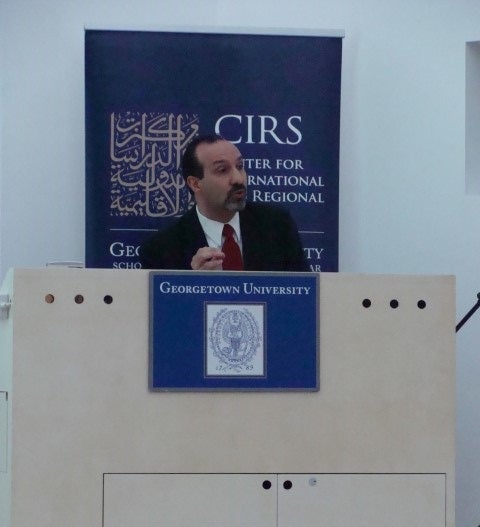American Studies, CIRS Faculty Lectures, Dialogue Series, Regional Studies
Mehran Kamrava on International Power Realignment in the Gulf

On March 10, 2009, a Monthly Dialogue entitled “International Power Realignment in the Gulf” was given by Mehran Kamrava, Director of the Center for International and Regional Studies and an expert on Iran and the Persian Gulf. The Dialogue was attended by Georgetown faculty, students, staff, and invited guests.
Kamrava’s Monthly Dialogue informed the audience about “how changing dynamics in the Gulf are resulting in the emergence of Qatar and the United Arab Emirates as major players in the region and beyond.” Kamrava argued that we are witnessing a shift in power alignments in the Gulf region as small states, such as Qatar and the United Arab Emirates, are exhibiting powerful performances in the region as well as within the international arena. In tandem with this trend, the position of the region’s traditional “big powers,” such as Iran and Iraq, are being gradually and strategically declining.
This power realignment is important in two respects. Firstly, Kamrava’s thesis regarding the Gulf region is that Qatar and the United Arab Emirates are unusual in that they are “small states” and yet are powerful players changing the international relations of the region. “These small states of Qatar and the United Arab Emirates, in many ways, do not fit the defined model. In fact, they are often times going against the model of how small states are supposed to behave in the international arena” according to the various international relations theories. They exhibit an extraordinary set of characteristics and engage in behaviors that are fundamentally atypical.
These countries, Kamrava noted, rely on the support and protection of global superpowers and Qatar is home to one of the largest United States airbases. These states also spend huge amounts of resources on forging a number of alliances with large states. Traditionally, small states limit themselves to dealing with their immediate geographic surroundings, but Qatar has shown a penchant for helping to negotiate in other countries’ regional and civil strife. These small states show a growing self-confidence and clout and have become “norm makers” as they influence others with their particular style of international relations and, essentially, “change the rules of the game.”
These small states’ power, Kamrava pointed out, is evident in three distinct areas:
- Neither Qatar nor the United Arab Emirates blindly tow Riyadh’s line as they have done historically, particularly concerning trade relations and policies.
- Both these states demonstrate some fearlessness in relation to Iran, with particular emphasis on their struggle over the issue of the three islands. These countries have also reclaimed their symbolic sovereignty by re-naming the area the “Arabian” Gulf rather than conforming to what has been known historically as the “Persian” Gulf.
- With the decline of Iraq’s regional influence, these states have emerged as major regional power players.
One of the most important issues regarding these particular small states, Kamrava argued, is that not only do these states change the power dynamics in the region, but they are instrumental in changing our very conception of what constitutes power in the first instance. Traditional scholarship argues that there are two types of power: hard power and soft power. “Hard power” is a country’s ability to gain influence and submission from others through military or forceful means and “soft power” is how a country gains influence by having a strong appeal and by attracting others to its particular values systems and norms.
Kamrava concluded by noting that Qatar and the United Arab Emirates exhibit neither of these powers and yet, they are highly influential and successful states. Kamrava argued that what these small states do have is what he terms “civilian power,” which is a combination of personal and state-owned wealth and stability along with strategic and clever use of these assets. These countries have vast sovereign wealth funds that have allowed Qatar and the United Arab Emirates to be partially shielded from the damage that the global economic crisis has had on the rest of the world and has given these small states “big power.”
Dr. Mehran Kamrava is Director of the Center for International and Regional Studies at Georgetown University’s School of Foreign Service in Qatar. He received his PhD in Social and Political Sciences from the University of Cambridge. His specialties include political development, comparative politics, and Middle Eastern Studies.
In addition to a number of journal articles, he is the author of Revolution in Iran: The Roots of Turmoil (1990), The Political History of Modern Iran: From Tribalism to Theocracy(1992), Revolutionary Politics (1992), Politics and Society in the Third World (1993),Understanding Comparative Politics: A Framework for Analysis (1996), Democracy in the Balance: Culture and Society in the Middle East (1998), Cultural Politics in the Third World(1999), Politics and Society in the Developing World, 2nd ed. (2000), The Modern Middle East: A Political History since the First World War(2005), and Iran’s Intellectual Revolution(2008). He has also edited The New Voices of Islam: Rethinking Politics and Modernity(2006) and is the co-editor of the two-volume work Iran Today: Life in the Islamic Republic.
Article by Suzi Mirgani, CIRS Publications Coordinator.